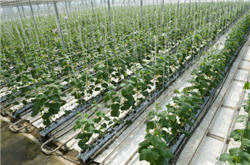In July, at the Association for Computing Machinery’s MobiSys conference, researchers from MIT and Princeton University took the best-paper award for a system that uses a network of smartphones mounted on car dashboards to collect information about traffic signals and tell drivers when slowing down could help them avoid waiting at lights.
A University of Alberta study is sounding a warning about forestry practices in North America, claiming that climate change is already rendering established planting guidelines obsolete.
The same University of Washington researcher who used chemical sleuthing to deduce what’s in fragranced consumer products now has turned her attention to the scented air wafting from household laundry vents.
Baylor University environmental researchers have proposed in a new study a different approach to predict the environmental safety of chemicals by using data from other similar chemicals.
The U.S. Environmental Protection Agency recently announced that the Great Lakes Restoration Initiative is setting aside approximately $6 million for federal agencies to sign up unemployed workers to implement restoration projects in federally-protected areas, on tribal lands and in Areas of Concern in the Great Lakes basin.
Imagine being able to get the equivalent of 70 miles per gallon in your car, keep your home cool and power your computer – all from sewage. Thanks to technology developed by University of California-Irvine’s National Fuel Cell Research Center and partners, that’s now possible.
Findings, published online this week in the journal Air Quality, Atmosphere and Health, show that air vented from machines using the top-selling scented liquid laundry detergent and scented dryer sheet contains hazardous chemicals, including two that are classified as carcinogens
Billions of tons of carbon trapped in high-latitude permafrost may be released into the atmosphere by the end of this century as the Earth’s climate changes, further accelerating global warming, a new computer modeling study indicates

Gotham Greens, a hydroponics greenhouse facility, sits on a warehouse rooftop and brings new meaning to the phrase "locally grown" – especially atop a 15,000-square-foot manufacturing building in Greenpoint, Brooklyn.
A new University of Colorado - Boulder study indicates a major climate oscillation in the Southern Hemisphere, expected to intensify in the coming decades, will likely cause increased wildfire activity in the southern half of South America.
A new explanation for one of nature's most mysterious processes, the transformation of caterpillars into moths or butterflies, might best be described as breathless.
In rural areas of Africa, Asia, and Latin America, poor farmers supplement their livelihoods by hunting and cutting wood, but such practices can seriously threaten biodiversity in the developing world. Now, two Cornell University researchers are leading the way to explore solutions that not only protect biodiversity but also improve the livelihoods of the poor.
The U.S. Environmental Protection Agency (EPA) recently announced a new tool to allow 28 industrial sectors to submit their 2010 greenhouse gas (GHG) pollution data electronically.
Eutrophication harms the environment in many ways. Unexpectedly, nitrogen fertilizer may also be positive for the environment. And even acidic soils, promoting the destruction of forests, can have a positive effect. Researchers from the Biogeochemistry Department at the Max Planck Institute for Chemistry in Mainz found out that nitrogen fertilizer indirectly strengthens the self-cleaning capacity of the atmosphere.
The explosive growth of cities worldwide over the next two decades poses significant risks to people and the global environment, according to a meta-analysis published today in Plos One.
A novel microscopy method at the Department of Energy’s Oak Ridge National Laboratory is helping scientists probe the reactions that limit widespread deployment of fuel cell technologies.
The sobering study fount that Western Europe emits about twice as much HFC-23 as officially reported.
How common are droplets of saltwater on Mars? Could microbial life survive and reproduce in them? A new million-dollar NASA project led by the University of Michigan aims to answer those questions.
Researchers at the University of California, Riverside along with their research partners received a $1.2 million grant from the Department of Energy to study and evaluate technologies that provide feedback to drivers so they can cut harmful emissions and reduce fuel use by up to 30 percent.
A report forecasts that the EV cybersecurity market will increase from just $26 million in 2011 to $144 million by 2015, with a cumulative investment of $432 million during that period.